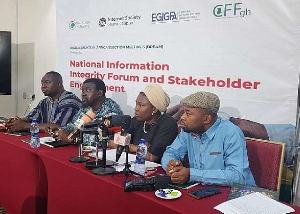 The forum aimed to engage key stakeholders in discussions surrounding digital rights
The forum aimed to engage key stakeholders in discussions surrounding digital rights
In the lead-up to Ghana's crucial December 7 general elections, the National Information Forum held a consultative meeting with the media and other stakeholders on October 30, 2024, in Accra.
It was organized by Paradigm Initiative under the umbrella of the Digital Rights and Election in Africa Meetings (DREAM) in collaboration with Community Focus Foundation Ghana (CFF-Ghana), E-Governance and Internet Governance Foundation for Africa (EGIGFA), and the Internet Society Ghana Chapter (ISOC Ghana).
The forum aimed to engage key stakeholders in discussions surrounding digital rights, election transparency, and the mitigation of misinformation, especially during election periods. With past iterations of this project having been successfully implemented in Nigeria, Liberia, and Sierra Leone, the Ghana edition sought to provide a platform for stakeholders to address challenges posed by digital rights issues, misinformation, and internet restrictions during elections.
The forum brought together a diverse range of participants, including representatives from:
• Civil Society Organizations (CSOs)
• Political parties: New Patriotic Party (NPP), National Democratic Congress (NDC), Great Consolidated Popular Party (GCPP), All People’s Congress (APC), and People’s National Convention (PNC)
• Academia: University of Ghana (UG), University of Professional Studies, Accra (UPSA)
• Government Agencies: Ministry of Information, Ghana Chamber of Telecommunications, Commission on Human Rights and Administrative Justice (CHRAJ-Ghana), Judicial Training Institute (JTI)
• Religious leaders (clergy) and the media
The platform enabled these groups to collaboratively address challenges and strengthen democratic governance through digital rights protections.
Civil Society Organizations (CSOs) in attendance pledged to empower citizens by disseminating accurate information on electoral processes, committing to holding the government accountable by highlighting public concerns and issues affecting citizens.
The CSOs agreed to engage development partners and state institutions to address digital rights abuses and promote election transparency, further committing to work with media platforms to establish a code of conduct for election reporting and reducing the spread of misinformation.
Development partners at the forum emphasized the importance of safeguarding internet freedom and supporting CSOs in democratic advocacy efforts.
They committed to active participation in discussions surrounding digital rights and the protection of democratic processes in Ghana, further advocating for vigilance and awareness to prevent internet restrictions that could affect the transparency of the elections.
Political parties that participated in the forum committed to maintaining responsible communication with constituents, avoiding incitement, and supporting fair digital practices. They agreed on the importance of digital rights and media freedom in ensuring a credible electoral process.
The government committed to refraining from using state agencies to intimidate or influence the population through fear. Regulatory agencies acknowledged the need to improve transparency and accountability by supporting digital rights protections and fair media practices.
Recommendations:
Recommendations made at the forum centered on empowering citizens and ensuring transparency, calling on CSOs to employ grassroots approaches to educate citizens on electoral processes and digital rights.
It was further recommended that a structured code of conduct for media operations during election periods be implemented to ensure responsible journalism.
It was strongly recommended that the government publicly commit to refraining from internet shutdowns or restrictions during elections to uphold the principles of open and fair electoral practices.
Development partners and the international community were urged to monitor Ghana’s digital rights landscape and support initiatives that promote transparency and accountability.
There were also calls for establishing fake news detection systems and clear guidelines for online platforms, including collaboration with social media providers, which are critical to addressing election misinformation and disinformation.
Legislative Review:
It was agreed at the forum that the Ghanaian Constitution required a revision, particularly concerning appointments within institutions to ensure accountability and impartiality during elections.
Maintaining Democratic Standards:
Stakeholders were urged to treat emerging threats to Ghana’s democracy with the same caution applied to other nations facing similar challenges to preserve the nation’s democratic integrity.
The forum underscored the importance of digital rights in democratic governance, with stakeholders emphasizing collaboration, accountability, and proactive measures to support a fair and transparent election process in Ghana.